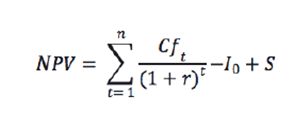Difference between revisions of "SPIS Toolbox - Finance - Annex"
***** (***** | *****) m (→Annex) |
***** (***** | *****) m (→Annex) |
||
| Line 43: | Line 43: | ||
'''''Formula:''''' | '''''Formula:''''' | ||
| − | [[File:Formul1.jpg|thumb|Formula]] | + | [[File:Formul1.jpg|thumb|left|Formula]] |
Revision as of 18:25, 2 June 2017

Introduction
Do want to know all about SPIS – Solar Powered Irrigation System : Please go to the newly launched standalone Solar Powered Irrigation Systems (SPIS) website (www.spis-toolbox.org) , featuring three SPIS toolbox:
- Toolbox for beginners,
- Toolbox for farmers (new SPIS Web based App – to calculate design of the pumps),
- the Toolbox for experts - the updated version - Version 6
and additional resources (Publication about SPIS).
The Toolbox on Solar Powered Irrigation Systems (SPIS) is designed to enable advisors, service providers and practitioners in the field of solar irrigation to provide broad hands-on guidance to end-users, policy-makers and financiers. Risks related to system efficiency, financial viability and the unsustainable use of water resources can thus be minimized. The Toolbox comprises informative modules supplemented with user-friendly software tools (calculations sheets, checklists, guidelines). read more
Modules and tools touch upon:
- assessing the water requirements,
- comparing the financial viability,
- determining farm profitability and payback of investment in SPIS,
- sustainably design and maintain a SPIS,
- highlight critical workmanship quality aspects,
- and many more.

Annex
Annex – Collection of Formulae (Finances)
Average Cash Flow'
|
*Definition: The “cash flow” is the incoming and outgoing cash of a business. Expenses (costs) are considered as negative cash flows and revenues as positive ones. |
Formula:(Revenue-R –Operating Expenses-C) = Cf. = Cash flow
Payback Period* (PP)
|
*Definition: The payback period is the length of time required to recover the cost of an investment. |
Formula: I/(R-C) = PP = Payback Period
I=Initial investment (CAPEX)
C=Average annual operating expenses (OPEX), excluding depreciation
R=Average annual revenue
(R-C) = Cf. = Cash flow
Net Present Value* (NPV)
|
*Definition: The “Net Present Value” or NPV determines the present worth of an investment by discounting the cash inflows and cash outflows generated by this investment over its life span. For the determination of the NPV you need to define the expected life span of the investment as well as a discount factor, which might be near to the interest rate on deposits. You could also use the NPV for comparison of alternative investment options. |
Formula:




















